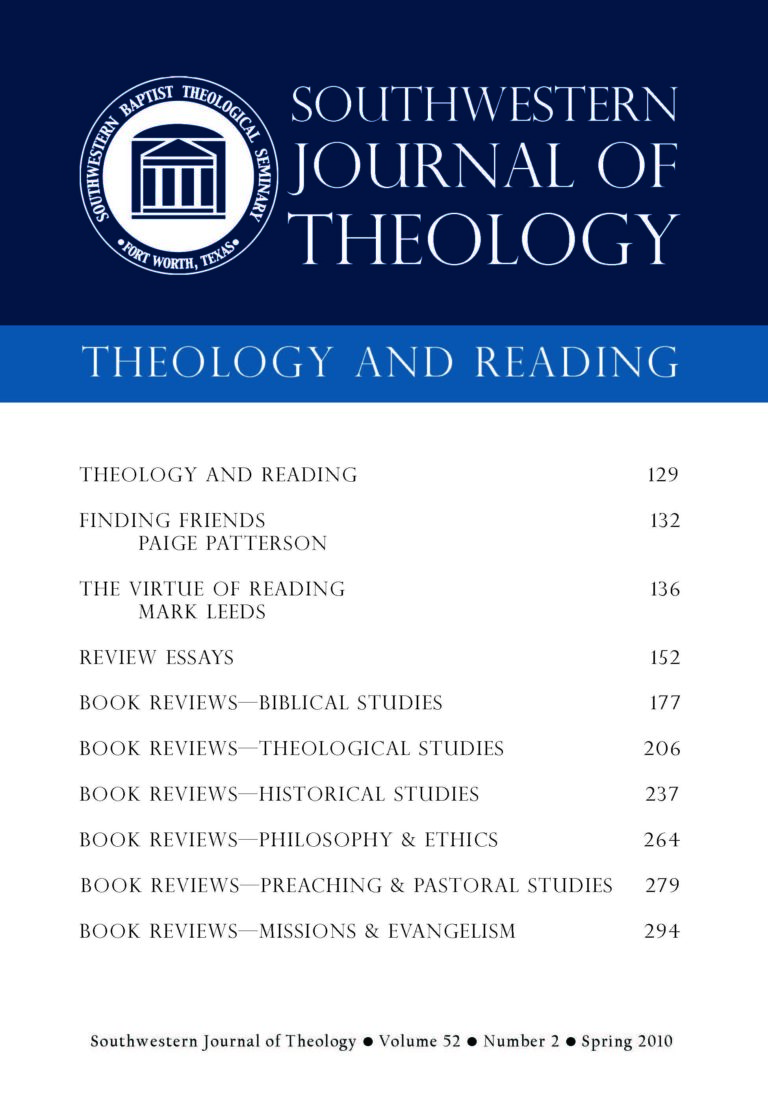
Theology and Reading
Southwestern Journal of Theology
Volume 52, No. 2 – Spring 2010
Managing Editor: Malcolm B. Yarnell III
By David W. Torrance and George Taylor. Edinburgh: Paternoster, 2008. 224 pages. Softcover, $19.99.
Torrance and Taylor have formulated an argument that reexamines the role that Israel plays in the history of God’s salvation. As a foundation, the authors give the historical context of the modern State of Israel and argue that the present conflict that has existed in the Middle East since the establishment of Israel in 1948 is primarily the result of religious convictions and not solely the result of politics. Moving from this foundation they proceed to argue that anti-Semitism and anti-Semitic tendencies that exist today and have existed at various points throughout the history of the church are the result of a failure to understand that Israel continues to be a witness to God despite her unbelief and that God continues to work through Israel in order to challenge the nations.
There are many valid points that Torrance and Taylor make. They correctly emphasize that the only solution to the problems in the Middle East is that God would intervene. Political initiatives, while important, are limited in their effectiveness for the peace between Israel and other nations. The authors’ arguments against Replacement Theology are well backed by a proper understanding of the idea of God’s everlasting covenant with Israel (130ff ), and a proper evaluation of the coming of Christ and the creation of the church as the initial fulfillment of the covenant with Abraham and not the cancellation of it. In addition, the authors rightly point out the fallacy of trivializing the land of Israel and a spiritualized understanding of the fulfillment of the Old Testament promises regarding the land. Another point of agreement for this reviewer is that the New Testament teaching is not anti-Semitic (77–88). Undergirding all of the authors’ arguments lies a biblical theology that understands the role of Israel as being hardened so that the Gentiles might be grafted in, but that Israel is still fulfilling God’s plan as a chosen people, and in the future there will be a time when the Israelites will be gathered back to Israel when the fullness of the Gentiles have come in.
The mistake that the authors make throughout the work is the implication that the restoration of Israel that is promised in the Old Testament has been fulfilled in the creation of the State in 1948. In fact, what the Old Testament looks forward to is a time of peace when a large number of Jews come to faith in Messiah, a time which can only be fulfilled when Jesus Himself returns to earth as King. To understand the current establishment of Israel in Palestine as the ultimate fulfillment of the Old Testament prophecies implies that Christ could not have returned prior to this time and puts the authors in a difficult position if there was to be a breakup of the current state of Israel. While the establishment of the State of Israel over the last century may in fact be a foreshadowing of the coming regathering, the kingdom of glory to come can only occur when Christ returns.
Explanations of the current turmoil in the Middle East, chapter two, and appendices one and two seem misplaced within a work dealing with a major theological question. As such, they may not be appreciated by many students and professors. Outside of these, the authors have produced a thought-provoking assessment of the role of Israel within God’s plan of redemption. Readers who have a bias toward dispensational thought may be uncomfortable with the suggestions that Jewish believers do not need to give up their Jewishness and the suggestions that God is not through with Israel. However, the authors’ arguments are not strictly dispensational and the reader should weigh the evidence of Scripture in validating their claims. There are other works which deal at a greater depth with a biblical understanding God’s covenant with Isreal and what the New Testament says regarding the fulfillment of that covenant. Nonetheless, Torrance and Taylor’s work has value in that it strongly raises the issues that the church must deal with in working out the question of the future of Israel and the role that Israel continues to play in the redemptive plan of God. For this reason, and because it is brief and easy to read, the book would have value for students and laypersons alike.





